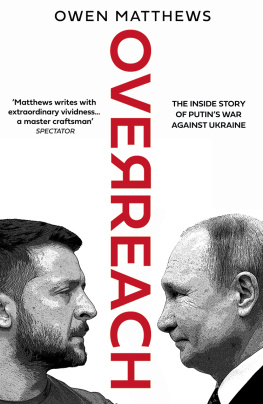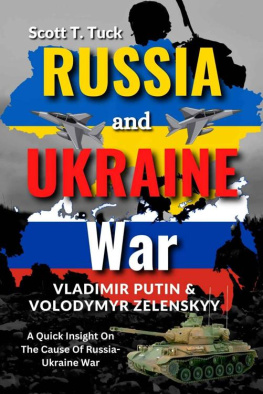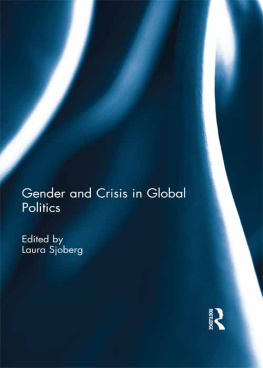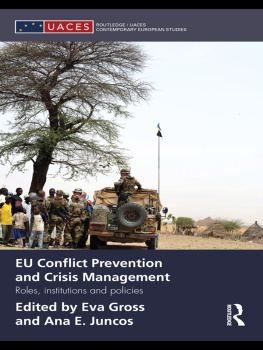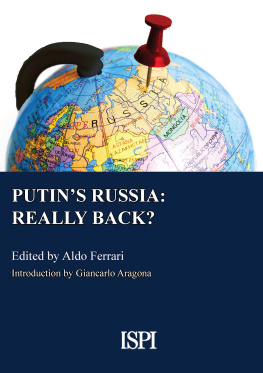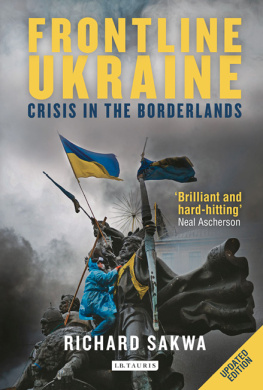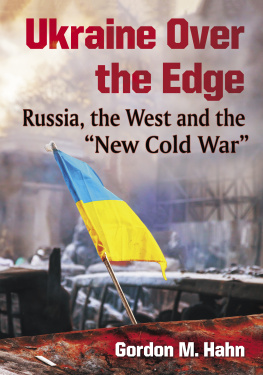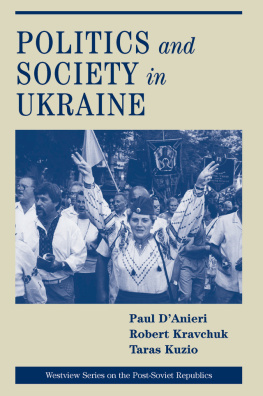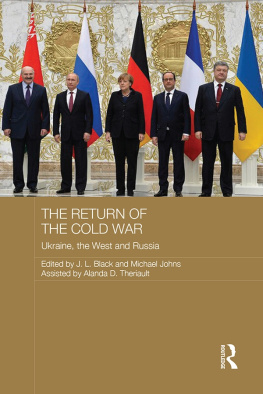Aftermath of the Ukrainian Crisis
The crisis in Ukraine that began in November 2013 constitutes a turning point in Euro-Atlantic security with potential global repercussions. It is the most significant security problem between Russia and the West in the post-Cold War period and the crisis has marked a new era in global politics. Contributions in this edited volume attempt to address a number of key aspects of the Ukrainian issue. How does the crisis impact upon Black Sea geopolitics and on regional governance? How can EURussia relations evolve under the new multipolar system? How is NATO affected? How important is the energy parameter in the RussiaUkraineEU triangle? This edited volume aims to disclose the diverse narratives on the roots, evolution and repercussions of the crisis, indicating the extent of its complexity and highlighting important parameters of the Ukrainian issue.
This book was originally published as a special issue of Southeast European and Black Sea Studies.
Panagiota Manoli is Assistant Professor in Political Economy of International Relations at the Department of Mediterranean Studies, University of the Aegean (Greece), and Research Associate at the Hellenic Foundation for European and Foreign Policy (ELIAMEP). Panagiota Manoli is also the author of The Dynamics of Black Sea Subregionalism (2012).
Aftermath of the Ukrainian Crisis
The crisis in Ukraine that began in November 2013 constitutes a turning point in Euro-Atlantic security with potential global repercussions. It is the most significant security problem between Russia and the West in the post-Cold War period and the crisis has marked a new era in global politics. Contributions in this edited volume attempt to address a number of key aspects of the Ukrainian issue. How does the crisis impact upon Black Sea geopolitics and on regional governance? How can EURussia relations evolve under the new multipolar system? How is NATO affected? How important is the energy parameter in the RussiaUkraineEU triangle? This edited volume aims to disclose the diverse narratives on the roots, evolution and repercussions of the crisis, indicating the extent of its complexity and highlighting important parameters of the Ukrainian issue.
This book was originally published as a special issue of Southeast European and Black Sea Studies.
Panagiota Manoli is Assistant Professor in Political Economy of International Relations at the Department of Mediterranean Studies, University of the Aegean (Greece), and Research Associate at the Hellenic Foundation for European and Foreign Policy (ELIAMEP). Panagiota Manoli is also the author of The Dynamics of Black Sea Subregionalism (2012).
First published 2017
by Routledge
2 Park Square, Milton Park, Abingdon, Oxon, OX14 4RN, UK
and by Routledge
711 Third Avenue, New York, NY 10017, USA
Routledge is an imprint of the Taylor & Francis Group, an informa business
2017 Taylor & Francis
All rights reserved. No part of this book may be reprinted or reproduced or utilised in any form or by any electronic, mechanical, or other means, now known or hereafter invented, including photocopying and recording, or in any information storage or retrieval system, without permission in writing from the publishers.
Trademark notice: Product or corporate names may be trademarks or registered trademarks, and are used only for identification and explanation without intent to infringe.
British Library Cataloguing in Publication Data
A catalogue record for this book is available from the British Library
ISBN 13: 978-1-138-68474-4
Typeset in Times New Roman
by RefineCatch Limited, Bungay, Suffolk
Publishers Note
The publisher accepts responsibility for any inconsistencies that may have arisen during the conversion of this book from journal articles to book chapters, namely the possible inclusion of journal terminology.
Disclaimer
Every effort has been made to contact copyright holders for their permission to reprint material in this book. The publishers would be grateful to hear from any copyright holder who is not here acknowledged and will undertake to rectify any errors or omissions in future editions of this book.
Contents
Citation Information
The chapters in this book were originally published in Southeast European and Black Sea Studies, volume 15, issue 2 (June 2015). When citing this material, please use the original page numbering for each article, as follows:
Preface
Preface
Ino Afentouli
Southeast European and Black Sea Studies, volume 15, issue 2 (June 2015) pp. 119120
Chapter 1
Global and regional repercussions of the Ukrainian crisis: an introduction
Panagiota Manoli
Southeast European and Black Sea Studies, volume 15, issue 2 (June 2015) pp. 121127
Chapter 2
Security relations in the Black Sea region: Russia and the West after the Ukrainian crisis
Nadia Alexandrova-Arbatova
Southeast European and Black Sea Studies, volume 15, issue 2 (June 2015) pp. 129139
Chapter 3
RussiaEU relations at a crossroads: preventing a new Cold War in a polycentric world
Alexey Gromyko
Southeast European and Black Sea Studies, volume 15, issue 2 (June 2015) pp. 141149
Chapter 4
NATORussia security challenges in the aftermath of Ukraine conflict: managing Black Sea security and beyond
Sharyl Cross
Southeast European and Black Sea Studies, volume 15, issue 2 (June 2015) pp. 151177
Chapter 5
Crimea and the quest for energy and military hegemony in the Black Sea region: governance gap in a contested geostrategic zone
Steven Blockmans
Southeast European and Black Sea Studies, volume 15, issue 2 (June 2015) pp. 179189
Chapter 6
After the Ukrainian crisis: Is there a place for Russia?
Hanna Shelest
Southeast European and Black Sea Studies, volume 15, issue 2 (June 2015) pp. 191201
Chapter 7
The energy parameters of the RussianUkrainianEU impasse: dependencies, sanctions and the rise of Turkish Stream
Theodoros Tsakiris
Southeast European and Black Sea Studies, volume 15, issue 2 (June 2015) pp. 203219
For any permission-related enquiries please visit: http://www.tandfonline.com/page/help/permissions
Preface
Following the illegal annexation of Crimea and the change of borders of a sovereign state, we are certainly facing a change of paradigm in the relations of Russia with the West. This change happened in a year marking the 25th anniversary of the fall of the Berlin Wall 8 November 1989. Is it a pure coincidence?
Russia driven either by geopolitical or by internal political concerns undermines the order established in the 1990s with the consent of the then Russian leadership. Russia also casts doubt to decisions made by sovereign states and democratically elected governments. Why Russia should have a veto regarding the European and Euro-Atlantic integration of the democracies of central, eastern and south-eastern Europe? Questioning what happened in the last two decades, Moscow puts its own geopolitical interests above the free, democratic choice of the people of central, eastern and south-eastern Europe. In fact, it denies these people the right to democracy and free choice of their own future.
What happened in the European continent following the end of the Cold War was a democratization and stabilization process that allowed the reunification of the continent in a peaceful way. It was a pattern that allowed western European countries to cure the traumas of the Second World War and develop democratic institutions that secured peace and stability. It was this values-based model that allowed Germanys reintegration to the Western system after the war, and it was this same model that the West chose to secure peace and stability following Germanys reunification. So, there is nothing new and nothing bad about this choice. The option of westernization/Europeanization offered the countries of Central and Eastern Europe the opportunity to develop and prosper through democracy and integration. Lets think about the political and economic situation in Poland, in the Czech Republic or in the Baltic countries 25 years ago. And lets compare it with todays situation: the Euro-Atlantic and European integration offered to all new members the opportunity to choose their own future without patrons. Who could have denied to countries belonging historically to Europe the right to reintegrate their natural geographic and geopolitical environment?


